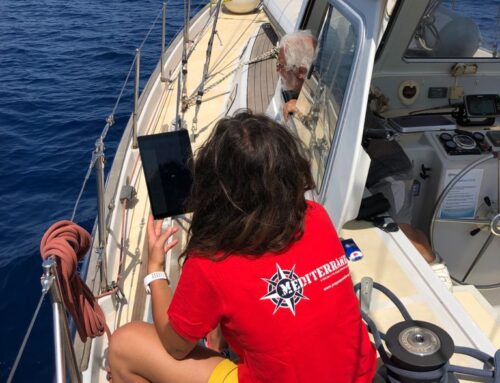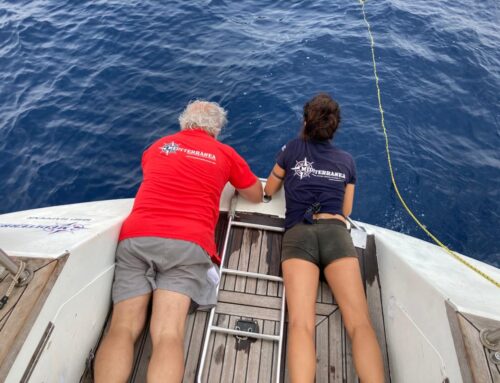(by Simone Perotti)
“I’m just a boring civil servant…” That’s how, Panayiotis Makris, diplomat, ambassador and Chairman of the Hellenic Foundation of Culture introduces himself. And then apologises “sorry if I am so elegantly dressed, but I have an appointment this evening…”. It is indeed surprising to see aboard the Mediterranea, a boat of Spartan and simple sailors, a man with a shrewd smiling face, quick sharp eyes, and the manners of a gentleman, dressed in a blue blazer, ice grey pants, white shirt and regimental tie, wearing rather worn Church’s.
It was Ersi Sotiropoulos, writer and adventuress, who told us about him and in just a few words arranged this appointment “you have just got to meet him, he is a man with a splendid brain”. They have been friends since their Rome days, he was a young diplomat and she worked with the cultural office at the Embassy. “One evening Panayiotis made pasta with sesame seeds. We didn’t have a cent between us to buy the sauce. Those were days full of hope and life …”. I look at him, at his sweet expression and guarded noble gestures, and wonder what their life was like in the exhilarating Rome of the Seventies and Eighties.
In just a few moments we are talking together about almost everything, first in Italian then in English. Words used sparingly, with no intention of gratifying, but rather of making a statement. “We Greeks made all the headlines, until just some time ago, on the edge of bankruptcy, the abyss. On the other hand it’s quite understandable, we failed to modernise the Country, we failed to complete the reform process, which were carried through only to a certain point. All the work done to become a part of the European Union at all costs, even perhaps by retouching our accounts, just like so many other Countries, was not followed up by the work required for the adjustment. We are the result of forty years of bad management of public affairs”. But what now? What is Greece going to do? “We can do it, but we need resilience and determination. My pension was more than halved, from 4,200 euro to 2,000, but that’s fine because the 700 euro pensions were increased slightly. There is justice in these austerity measures, and people understand it, at least most people”. Here we are then on board the Mediterranea with someone who is convinced Europeist. Inevitably our conversation turns to Europe. “We must not make excuses. The political class reflects the image of the Country. There is no point in saying that politicians are inadequate, they are like those who elect them, sometimes better”. I nod, I have always thought so and even publicly written this about Italy. “The Country was not ready for Europe, we entered the European Union too soon. But now it is unthinkable to do anything else. We have common European roots, and Europe must be the home of what we have in common”. Panayotis Makris makes a supersonic sweep of the history, in reverse, and I am surprised at the lucidity of his thinking: “Globalisation comes from the technological culture developed by the Western world, and this is the natural consequence of Renaissance humanism, which has its roots in classical culture, and thus we are responsible for this long process”. A rapid, shrewd concatenation, which I jot down quickly in my notepad. I think of the sign @, which is perhaps the logo of our technological culture, and which does not come from the Silicon Valley, but from the Venetian traders, who used the symbol to show where goods were to be shipped.
But will it not be necessary to review the European formation process? Besides flogging ourselves because we have failed as member states, should we not be self-critical about the way the contract for membership to Europe was drafted and then implemented? “I admit it, the formation of the UE should have been a more balanced process. But what we can do today does not include questioning the contract”. But as Member States we followed the North American and North European culture, instead of contributing with our own culture. When did we allow ourselves to be culturally colonised? How can we today recover space and contribute to, level out and re-address matters? “There is only one way to do that, through education. Schooling and classical culture. The Mediterranean school of thought can and must recover its role through education. Schooling is not an employment proposition, but a specific programme. It is in schooling that we have lost, and it is through schooling that we can and must recover our role”. But the causes of the recession cannot be attributed merely to Greece, or Spain. Why is there no self-criticism in Europe and when things go wrong why the blame is placed only on a single Country? “Self-criticism is necessary, but we are not the ones who can criticise. You can criticise only if you are the first who intends to change, otherwise it means nothing. If you are working to have a new political class, for example, but we are not doing that”. Is it not a cultural problem perhaps? How can we even things out, or at least recover space with respect to the empirististic, liberalist, economic and financial culture? “We have to return to the universities starting from the bottom, educating young people at middle and high school so that they become the result of renewed classical culture. The UE for that matter originated from the richer Countries, so that the infusion of their philosophy was inevitable. At that moment not all intellectuals did their part nor are doing so now. Not everyone proposes concrete solutions, if anything they call for radical changes, which are however dangerous and do nothing more than nurture nationalistic, neofascist and separatist beliefs”. But this is exactly what generates a lack of self-criticism! And it is when people do not question themselves that you leave space to these extremist factions, allowing them the exclusive right of adopting a critical position! “But this must be a process. We cannot weaken the structural system of Europe. With patience, through schooling, we must improve it internally”. I let this point go, to come back to it more than once, but Panayiotis Makris does not give way an inch. We simply don’t agree on this, even if I have to admit that what he is saying with such courteous firmness stays with me, and makes me think. A very deep man, who does not simply speak of current beliefs. It is quite evident that he loves history, culture and is accustomed to thinking about what he says.
“We will never be able to have a Mediterranean society without North Africa and the Middle East. Only that these Countries have had a revolutionary history, based on pro-socialist positions, as a result of colonial imperialism before and after the Cold War. This different direction of our common and recent political past creates a distance today, and it will take a very long time to reduce that distance. Undoubtedly however, without North Africa we cannot speak of a united Mediterranean. And if you think about it, even among European countries, Greek and Italy are much closer than Spain. But this is all just idle chatter. I always come back to the same point: we need people who can interpret the subtleties, and we need to shape these people at school, with the tool of classical culture. That is where progress will be made”. He’s right, certainly, even if his defence at all costs of a European system which originated wrongly, based entirely on economy and budgets, is a contradiction of that very classical school of thought that Panayiotis Makris invokes.
In a flash the diplomat is back, the man of foreign politics. His strategy is that “we must express our closeness and solidarity towards Countries of the Mediterranean who are in difficulty. We must not leave them alone, and a prey to different forms of fundamentalism. Their European components must be nurtured, kept alive, to prevent them from being swallowed up by that third world and backward component which lives by side with them”. We speak of migrants (“a crucial point”) of neofascisms (“most of those people are former left wing extremists and those who vote for them are the former working class”) of the barrier that culture may create against the worst deviations of the system (“the primary defence against extremists is aesthetically based”) of the risk of civil war in Greece (“I exclude it. There is a risk of terrorism, , in the whole of Europe, but not of civil war”) and of our journey (“utopias are useful. What you do is immensely important. We have common roots of enormous value, that must be once again be merged”).
Then, with the sun now setting, we say goodbye. He seems to smile gratefully for our one and a half hour chat. I hope to meet this man again. I would like to be able to comment the news with him, every day. But the time for the Mediterranea to depart towards the East is now close on hand.






Leave A Comment